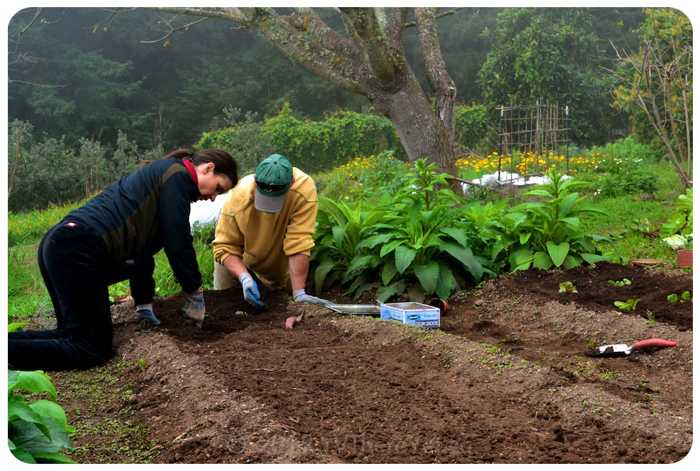Baking Soda Delights in the Kitchen
 I love the fact that I can use natural and environmentally friendly products in the home to clean, cook, beautify and deodorize my world. Any part that I can do to reduce, reuse and recycle in the most efficient and least harmful manner is incredibly important to me. Some of my most used and favourite household items that I use everyday are baking soda and vinegar. In honour of every day being Earth Day (in my household it is!), I wanted to pass on these useful and original vintage recommendations offered up through one of my favourite resource websites for environmentally friendly tips: TipNut.
I love the fact that I can use natural and environmentally friendly products in the home to clean, cook, beautify and deodorize my world. Any part that I can do to reduce, reuse and recycle in the most efficient and least harmful manner is incredibly important to me. Some of my most used and favourite household items that I use everyday are baking soda and vinegar. In honour of every day being Earth Day (in my household it is!), I wanted to pass on these useful and original vintage recommendations offered up through one of my favourite resource websites for environmentally friendly tips: TipNut.
Hope these prove to be practical, helpful and fruitful (pun intended!) for you in your kitchen food prep and cooking. These tips have been sourced from a recipe booklet published in 1936 by Church & Dwight Company, Inc. (Arm & Hammer and Cow Brand baking sodas).
Timeless Wisdom collection is a regular feature on Tipnut where we take a look back at tips and methods used generations ago for efficient household management.
Baking Soda In The Kitchen: Vintage Tips
- When parboiling dried beans for baking, the addition of 1/2 tsp of baking soda to each 2 cups soaked beans makes the beans tender in a shorter time. When baked, the beans have a much sweeter flavour than those parboiled in plain water. All dried legumes such as lima, kidney or navy beans and peas, have a better flavour if treated in this manner.
- Scalloped potatoes or other scalloped dishes are sometimes spoiled in appearance by curdling of the milk. 1/4 teaspoon baking soda to each pint of milk prevents the curdling.
- In the preparation of hominy, use 1 ounce of baking soda (2 level tablespoons) and 3 pints of water to each pound of field corn. Dissolve baking soda and add corn. Bring corn to boiling point, cover and simmer 1 1/2 hours. Hulls and black eyes can be removed by rubbing between the hands. 6 or 7 washings will remove all traces of soda.
- When washing spinach, add a small amount of baking soda (about 1/4 teaspoon for each peck of spinach) to the last rinse water. Cook as usual. The vegetable will retain its lovely fresh colour.
- When stewing rhubarb or gooseberries, add 1/8 teaspoon baking soda for each 2 cups. This reduces the quantity of sugar required by 1/3. For each 2 cups of rhubarb or gooseberries, use 2/3 cup sugar in place of the usual cup.
- If the skin clings to peaches or apricots when peeling for canning, prepare a solution of 1/2 cup baking soda and 2 gallons of water. Bring to boiling point and, while actively boiling, immerse fruit (using a wire basket) until skin is loosened. Remove fruit, wash at once in clear water and remove skins by rubbing.
- When baking ham or pork chops in milk, the addition of 1/4 teaspoon baking soda to each pint of milk prevents the curdling which so often detracts from the appetizing appearance of the meat.
- When boiling corned beef, add 1/4 teaspoon baking soda for each pound of beef. This will improve the colour and flavour of the meat. Cabbage and other vegetables can be cooked in the same water without becoming dark or slimy.
- Clean all meat as soon as unwrapped with a baking soda solution (1 teaspoon baking soda to 2 cups of water). This removes foreign matter and dried blood. Put on a clean plate and place in refrigerator.
- After drawing fowl, wash well, both inside and out, with a baking soda solution (1 tablespoon to 2 quarts of water). Let solution run through the bird several times. Rinse well with clear water. Pat dry with clean towel.
- Clean fish, both inside and out, in a baking soda solution (1 tablespoon to 2 quarts of water). Dip entire fish in the solution; wash quickly and rinse in clear water. Dry immediately and store in cold place. Before opening, wash clams and oysters with a brush dipped in the baking soda solution. Fresh shrimp and other shell fish should be washed well in the same strength baking soda solution before cooking.
- When preparing cream of tomato soup from canned tomato soup or home-made tomato puree, add 1/8 teaspoon baking soda to each cup of soup or puree. This prevents curdling when the milk is added.
Source: Tested Recipes: Successful Baking For Flavor And Texture (1936)

hello john and sky
Dream today what you dream for tomorrow .
pleasant thoughts of you both
love mom dawson